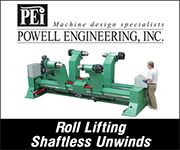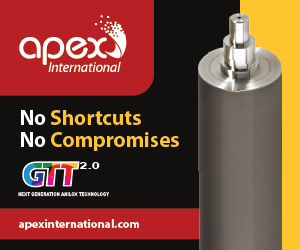A Clear Winner
- Published: April 01, 2003, By Edward Boyle, Contributing Editor
Thirsty for new business, forms converter BBF Printing Solutions finds success in the private label beverage market with help from material supplier Raflatac.
Some people might have a hard time describing, in just a few words, a company that makes everything from business forms, labels, commercial brochures, and plastic cards to hang tags, postcards, and chipboard backings for blister packs.
Not Tom Nagy, the Flexographic Div. marketing manager for BBF Printing in Largo, FL.
“We are a printing solutions company,” he says simply.
And that's just what the company is for its more than 5,000 customers in the southeastern US. Established more than 40 years ago as Better Business Forms (which still remain one of its core businesses), the company gradually has expanded its capabilities to become a full-service provider of a diverse range of specialty printed products.
Need a process-color hang tag to display your socks at the local K-Mart? No problem. How about a ten-color label to market bottled water for a Girl Scouts fund raiser? It's done quicker than they could say, “We're going to Disney World.”
Of course, it wasn't always that simple. But while many business forms companies have gone out of business in the face of changing market dynamics, BBF Printing not only changed its name but its focus as well.
Adding Capabilities
Two years ago, the company expanded one of its market niches, the production of one-, two-, and three-color thermal transfer labels, with the addition of not one, but three, ten-color Mark Andy 2200 UV flexo presses at its 200,000-sq-ft production facility. At about the same time, BBF installed a six-color, 28×30-in. Komori offset press and state-of-the-art prepress equipment—from DuPont platemaking to Best Screenproof digital RIP software and the Epson Pro 10600 wide-format ink jet proofer system—to further expand its capabilities. That allowed BBF's five dozen sales people to offer their thousands of existing and potential customers from Florida to North Carolina a true “one-stop shop” for printed materials.
“Now we have all of those products under one roof, and that's what I believe separates us from 90 percent of the other flexographic providers out there,” says Nagy, who joined the company shortly after the Mark Andy presses arrived.
“And if we're selling pressure-sensitive labels to an account, “ he adds, “there's a good chance they also have products that could use a hang tag, that could be sold in blister packs, or that could be marketed through a brochure. The flexo label business pulls all of those other products over with it.”
Exploring Opportunities
Company president/CEO Joe Baker, himself a long-time veteran of the business forms industry, watched like many others as computer technology began eroding the demand for business forms. So, as thermal transfer-printed receipts began replacing multi-part forms in the credit card arena, his company began converting thermal transfer labels on 16- and 20-in. Mark Andy and Webtron presses.
Baker also saw that while growth rates in business forms were dropping to single-digit percentages throughout the '90s, many p-s label converters were enjoying double-digit growth. Given the company's p-s label manufacturing experience, coupled with its long-standing relationships with key accounts across the southeastern US, BBF decided to grow its flexo division and explore opportunities in the prime label sector by adding the three Mark Andy ultraviolet flexo presses.
“Entering the prime p-s label market wasn't a difficult decision for us,” says Baker. “We have extensive UV experience with our direct-mail presses, we have 15 years worth of experience printing pressure-sensitive paper label applications, and we have what most companies would love to have — 5,000 active accounts in the southeastern United States.”
BBF also had one thing every other label company would envy — a parent company that ranks as the 17th largest printing conglomerate in world. Headquartered in Ireland, the Clondalkin Group PLC owns several companies in the US, each involved in a unique printing process, including one that makes foil lids and paperboard containers. BBF, however, is its sole p-s label converter in North America.
Realizing the growth potential of that market, the company decided to invest heavily in the equipment and technologies that would make BBF a cornerstone of its North American printing and packaging operations. It also relied on its experienced personnel at other Clondalkin sites in Europe that specialize in high quality, p-s label applications to get its Florida operation up to high quality standards quickly.
“We brought several of the manufacturing people over from England and Ireland for a period of time, and we sent a group of our employees over to Europe,” explains Baker. “This drastically cut down on our learning curve once the presses were installed and running. We knew we had the right equipment, however it was imperative that our people obtained the right training.”
Label Printing Challenges
Like other label converting company presidents, however, Baker recognized that one of the most important factors in his successful prime label-printing equation would be finding the right person to manage the division — a person who possessed in-depth p-s know-how, coupled with a background in prime label application technologies and trends. Baker found that person in Nagy, who had spent eight years in Avery Dennison's film division as a prime label product manager.
“It has been extremely challenging at times since the nature of our business primarily has been the forms industry,” explains Nagy. “There has been an education that has had to occur, and continue to evolve, with our sales personnel. We are gaining pieces of business and we continue to grow. I feel the quality of product that we're producing is the equivalent, if not better, than [that of] any printer in the state of Florida. Many of our suppliers tell us that, and the people that buy our product tell us that. We didn't enter the prime label business as a known entity. We've had to go out and make a name for ourselves, and that is exactly what we're doing.”
Early on, Baker and Nagy recognized that niche specialization was going to become a crucial part of being able to differentiate BBF Printing in a competitive marketplace where the company's name was basically unknown. BBF has quickly emerged as a leader in the private label market, supplying both paper and film labels to a variety of industries, including food and beverage, chemical packaging, health and beauty aid, and cosmetics.
Private labeling, in particular, notes Nagy, has become a growing end-use subsector, as entities such as corporations, hotels, and resorts increasingly recognize a bottle of water, for example, as an effective marketing exposure vehicle. And there are nearly 500 different private label suppliers of bottled water. These “walking billboards,” as both Baker and Nagy describe them, are an inexpensive way to drive brand recognition across diverse groups of the consuming population. They are also one of the food and beverage industry's — and consequently BBF Printing's — fastest growing niches.
Nagy also notes its Mark Andy presses — with their patented “Quick Change” technology — are ideal for serving a market for run lengths that can vary from 5,000 to one million labels.
Materials Matter
“The non-pressure-sensitive substrates in the bottled water sector are most often used with extremely high-volume applications,” explains Nagy. “If a company is running millions and millions of labels, they want to produce them as fast as they can, and the labels likely are transported to a discount warehouse where they're sold in bulk. The driving force behind these high-volume applications is not esthetics, and the total applied cost is lower. However, we have found there's another tier of bottlers out there, companies that invest in product appearance. These companies often have the newer flat surfaces on the container, instead of the traditional ribbed surfaces, for a cleaner look. They want a pressure-sensitive label.”
Over the past several years, companies like BBF Printing have worked closely with p-s material manufacturers, like Raflatac Inc., to solve the problem of adhering clear labels to clear bottles without the adhesive disturbing the graphic appearance so critical to selling a product such as bottled water. When comparing a flat-paneled, p-s label-decorated bottle of water with a ribbed, non-p-s sleeve, the esthetic difference between the two can be vast. That's one reason Nagy views the role of the material supplier as vital.
“We buy from a select group of material suppliers, each standing on the merits they bring to the table,” says Nagy. “They each have unique properties that separate them. But when it's all said and done, it comes down to how badly they want your business and how they're going to provide service. The one key aspect that Raflatac brings to the table is the personal touch. They ask what we want, instead of telling us what we need. They truly listen, and their technological developments in the bottled-water labeling niche has helped us be very successful with these applications. Raflatac understands both the technical requirements of our applications and the expectations of the end-user. They have the right attitude about doing business in the US.”
The same, it seems, can be said for BBF Printing.
CONVERTER INFO
BBF Printing
10950 Belcher Rd.
Largo, FL 33777
727/545-8703; bbfprinting.com
SUPPLIER INFO
Raflatac
, Fletcher, NC; 828/684-3931; raflatac.com
Mark Andy Inc., Chesterfield, MO; 636/532-4433; markandy.com
Webtron Div. of PCMC, Green Bay, WI; 920/491-6637; pcmc.com
Komori America, Rolling Meadows, IL; 847/806-9000; komori.com
DuPont Co., Wilmington, DE; 302/999-4350; dupont.com
BestColor USA, West Chester, OH; 513/942-7111; bestcolor.com
Epson America, Long Beach, CA; 562/981-3840; epson.com












